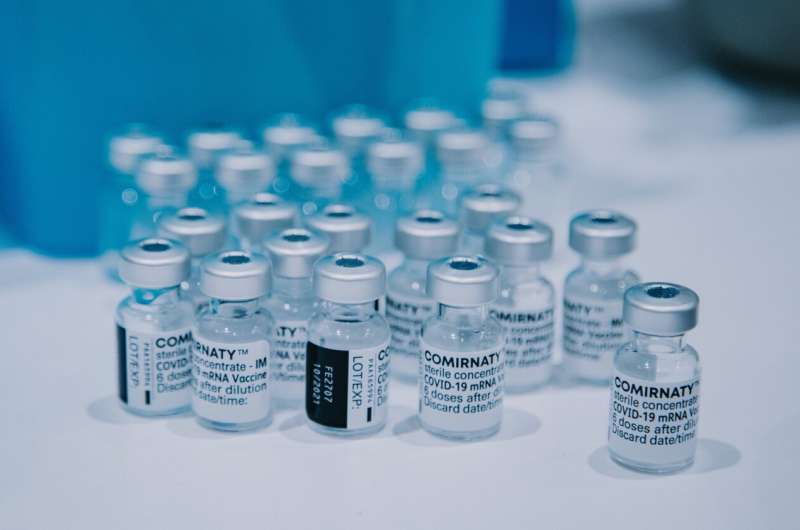This article has been reviewed according to Science X's editorial process and policies. Editors have highlighted the following attributes while ensuring the content's credibility:
fact-checked
peer-reviewed publication
trusted source
proofread
Researchers find that new approach to boosting protein production could advance mRNA and protein-based medicines

Medicines that are based on mRNAs and proteins—particularly vaccines and antibodies—are time-intensive and costly to make. The challenge is in producing the necessary mRNAs and proteins in large enough amounts at low cost.
Now, researchers at the Lewis Katz School of Medicine at Temple University have discovered a new way to boost protein production in cells by as much as several hundredfold. The findings, published online in the journal Molecular Therapy, could lead to the generation of a universal booster for protein production for the development of bioproducts, drugs, and vaccines.
"We are very excited about our discovery, given its potential to increase protein production for a broad range of applications across many fields and areas of research," explained Wenhui Hu, MD, Ph.D., Professor of Neuroscience and Pathology in the Center for Metabolic Disease Research and the Department of Pathology at the Lewis Katz School of Medicine. "It should be very useful for the production of therapeutic proteins like antibodies and mRNA vaccines."
The new breakthrough centers on Exin21, a sequence of 21 nucleotides that encodes a short peptide, designated Qα. Exin21/Qα, when added to the coding region of a targeted gene, possesses a unique ability to greatly increase the production of a specific protein molecule. The mechanism behind this increase lies in the promotion of mRNA synthesis and stability and protein expression and secretion.
Dr. Hu and colleagues made the groundbreaking discovery during an exploratory study related to COVID-19 and its causative virus, SARS-CoV-2. "At the time, we were trying to identify ways to enhance the expression of SARS-CoV-2 viral proteins in mammalian cells," Dr. Hu said. "During the process of molecular cloning, we accidentally found Exin21, which could boost the production of not only multiple SARS-CoV-2 viral proteins but also many other proteins."
In addition to showing that Exin21/Qα can increase the production of SARS-CoV-2 antibody, the researchers demonstrated that adding Exin21/Qα to any mRNA can dramatically increase the production of the corresponding protein. This was the case for many different types of proteins, including viral, nonviral, intracellular, structural, and secretory proteins.
Exin21/Qα was also found to increase the efficiency of viral packaging, the process by which viruses assemble the protein shell that stores their genetic material. Any inefficiencies in this process can have a significant impact on research involving viruses and pseudoviruses, particularly in the context of studying antibodies and vaccines against SARS-CoV-2 variants or emerging viruses. Exin21/Qα effectively addresses this bottleneck, making it an asset for viral studies.
"Our findings with Exin21/Qα are applicable to so many proteins that our research could lead to a paradigm shift in the production of mRNA and protein-based therapeutics," Dr. Hu said. "Being only 21 base pairs in length makes Exin21 universally accessible and useful for researchers in academia and industry."
The research team is now working to further optimize the use of Exin21 and similar motifs for boosting different types of antibodies and mRNA vaccines. They aim to extend their research beyond cell models to gain a deeper understanding of its function in living systems.
"Although the comprehensive underlying mechanisms remain to be elucidated, perhaps, similar coding-motifs, such as Exin24 or Exin27, could be identified in the future," Dr. Hu added.
Other researchers who contributed to the study include Yuanjun Zhu, A. Sami Saribas, Jinbiao Liu, Yuan Lin, Brittany Bodnar, Ruotong Zhao, Julia Ting, Zhengyu Wei, Aidan Ellis, Fang Li, Xu Wang, Xiaofeng Yang, Hong Wang, and Wen-Zhe Ho, Center for Metabolic Disease Research and the Department of Pathology and Laboratory Medicine, Lewis Katz School of Medicine at Temple University; and Qian Guo and Ling Yang, Department of Medical Genetics & Molecular Biochemistry, Lewis Katz School of Medicine at Temple University.
More information: Yuanjun Zhu et al, Protein expression/secretion boost by a novel unique 21-mer cis-regulatory motif (Exin21) via mRNA stabilization, Molecular Therapy (2023). DOI: 10.1016/j.ymthe.2023.02.012





















